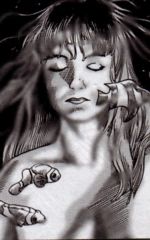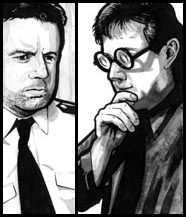>> The Friday Review: Pubo
>> The Friday Review: Get Your War On
More...

Strange, magical and ever so slightly sinister, Gary Spencer Millidge's STRANGEHAVEN has always stood out as something special in the overcrowded and often depressingly homogenous Anglo-American comics marketplace. A quiet, meandering mystery-come-soap opera with supernatural overtones, STRANGEHAVEN first appeared in 1995 and has been coming out on an infrequent basis ever since. A perennial critics' favourite, it also enjoys a strong fan following on both sides of the Atlantic, and has arguably become one of the cornerstones of the independent comics scene.
Written, illustrated and published by its creator, STRANGEHAVEN is clearly a very personal vision. Having devoted the last seven-odd years of his life to realising it, and with no plans to call it a day anytime soon, it's perhaps unsurprising to learn that creating his own comics has always been at the forefront of Millidge's mind. "I've always read comics - my Mum and Dad fed me with a constant supply of British weeklies from an early age - and I've always attempted to emulate them, from my earliest scrawled yellow crayon attempts through the fanzines of my college years to STRANGEHAVEN."
Millidge is candid about his passion for the medium; "It always seemed to me that the combination of words and pictures in comics were an equal, if not superior form of entertainment/communication than art, literature or film. It saddens me that most 'adults' appear to have an unshakeable prejudice against comics."
Although born in Hackney in London, Millidge has spent most of his life living in and around the seaside Essex town of Southend-on-Sea. Although he spent four years in Spain after his parents retired there, he returned to the UK after finishing school and enrolled at the Southend College of Technology, where he studied art. It was here that he made his first forays into self-publishing - although this had little to do with what he was learning in the classroom. "While I was experimenting with different styles and techniques at college, comics were never part of that. None of the lecturers were sympathetic towards my interest in comics and one or two of them tried to turn me against the medium.
 "But I had a couple of friends who were into comics - although not as much as I was - and we started up a strip fanzine together. So I was life drawing, studying photography, sculpting, painting and suchlike during the day, and going home to draw comics in the evening."
"But I had a couple of friends who were into comics - although not as much as I was - and we started up a strip fanzine together. So I was life drawing, studying photography, sculpting, painting and suchlike during the day, and going home to draw comics in the evening."
Millidge's first published work was in a fanzine called AMON*SPEK - an SF/Fantasy anthology lightyears from the type of material he would eventually try his hand at in STRANGEHAVEN. "This was at the end of the 1970s, a little after HEAVY METAL and Art Speigleman's RAW started publishing, and these were a big influence on AMON*SPEK - the first issue of which I co-created with another student, Graham Larwood - and which was a flimsy, photocopied affair. "But it was enough for the bug to take hold and I soon took over publishing and editing chores. The second issue on was lithoed and it lasted five issues before I realised I was spending all my time doing the administrative stuff and no time drawing, so I knocked it on the head."
Millidge's enthusiasm for the medium didn't wane, however, although he was also heavily involved in the local music scene by this time as well. After he left college, he had no real desire to get "a proper job", and was soon running his own comics shop by day while playing bass guitar in rock bands by night. "I did have a vague eventual aim - if naive and misguided - to have staff running a successful comic shop and publishing house while I spent my time creating comics in a back room somewhere."
During this time Millidge published Comics News Monthly - started as a newsletter, but eventually growing to resemble UK trade paper Comics International - and also the benefit comic FOOD FOR THOUGHT - which featured work by the likes of Alan Moore, Grant Morrison, Bryan Talbot and Warren Ellis.
'I wanted to tell all kinds of stories without a single plot-driven narrative.' "FOOD FOR THOUGHT was born out of a light-hearted conversation I was having in my comic shop with Warren Ellis, a young chap with a flair for writing and whose fanzines I was photocopying, and Dave Whitwell, a good friend of mine, about a possible comics equivalent of the Band-Aid single in aid of the Ethiopian famine.
"The idea grew and I ended up publishing it and raising a modest sum for the relief effort. It was my first real 'professional' looking publication and I learnt a lot, although it wasn't properly solicited through Diamond and distribution was more or less in the UK only."
Unfortunately, it wasn't too long after this that Millidge was forced to close his shop down due to ever-increasing debts. Depressed, despondent and in hock to the UK's sole comics distributor, Millidge spent the next few years concentrating on his musical career. "The collapse of my comics retail business, and the debt it left me in, kind of soured my relationship with comics for a while - and I thought that if I were going to break into the music business in a performing-artist aspect, I had better do it sooner rather than later."
"I set up a record company and publishing company in order to retain control - and collect royalties - from my music, my band's music and assorted other musical projects that I have been associated with. I even started setting up a commercial recording studio, but planning permission - and not working on my own stuff, again - put paid to that one. I own several hundred songs, one or two of which still bring in the occasional royalty, and I hope to record and release some of my better material at some point in the future."
After a long period spent working outside the comics industry, ambition and circumstance eventually combined to prompt Millidge into making his return with the self-published STRANGEHAVEN. "I had always intended to get back into comics, and when the music thing had run its course, I started working on a thing called INSOMNIA, which was a kind of precursor to STRANGEHAVEN. I was working for my brother at the time in a shoe retail business, and he had to cut my hours back, so that gave me the opportunity to start working intensively on a creator-owned, ongoing series. I ditched the INSOMNIA idea and worked up STRANGEHAVEN, with the intention of giving it all I had in terms of effort, investment and the experience I had gained over the years in retailing, publishing and the music business."
 As he envisioned STRANGEHAVEN as an open-ended, ongoing series, Millidge was keen to work with a concept he wouldn't easily grow tired of. "STRANGEHAVEN was originally intended to be a collection of short stories and continuing stories which just happened to take place, or be connected to, the same village," he explains.
As he envisioned STRANGEHAVEN as an open-ended, ongoing series, Millidge was keen to work with a concept he wouldn't easily grow tired of. "STRANGEHAVEN was originally intended to be a collection of short stories and continuing stories which just happened to take place, or be connected to, the same village," he explains.
"I wanted a vehicle that would enable me to tell all kinds of stories without relying on a single plot-driven narrative. I was getting more interested in personal relationships and the way in which people perceive reality in different ways. The soap-opera formula of a physical place where I could focus on different characters seemed the obvious choice, but I gave it a twist by implying that the village had a character of its own, in a subtle mystical sense.
"TWIN PEAKS was a huge influence of course, as was THE PRISONER, but I drew in other aspects from shows like THE DARLING BUDS OF MAY and THE AVENGERS. In comics, to a lesser extent, Heartbreak Soup' from LOVE & ROCKETS, based around Palomar, demonstrated that this sort of thing could be done in comics form, and the two issues of BIG NUMBERS also suggested that there was common ground. But I also found that I could pour things like UFOlogy and the Amazon into the mixture without it being too contrived. At least no more contrived than CORONATION STREET or EASTENDERS, anyway."
Despite the almost anthology-like format envisioned by Millidge, STRANGEHAVEN certainly seems to have found a focus in terms of a central plot - most obviously in the story of Alex Hunter and how his arrival in Strangehaven has stirred up trouble in certain sections of village society. As Millidge explains however, this is a misleading assumption. "There are a number of themes which are central to the series and there are a number of different plots which occasionally bounce off each other. As I've explored this, the different strands have been very closely intertwined, but there's no one overriding factor which contrives to tie everything together. STRANGEHAVEN was always intended to be a pot-pourri."
'I guess I grew up thinking that starting your own business was the only way to go.' Whilst STRANGEHAVEN's intriguing plot undoubtedly has a lot to do with the title's success, much of its charm comes from the rich characterisation of it's oddball cast, and Millidge's brilliantly observed renditions of them. "Every character is at least partly a facet of my own personality, or at least of personal experience.
"I think what adds another layer of realism is that I use real people as models for the visual likenesses, and their own body language probably adds a further dimension to the fictional persona which I've created. But I am conscious to write the character first, before looking for a model to 'play' the part."
Millidge's art has improved dramatically throughout the course of his run on the book, and is constantly evolving. Book three has seen a major change in style, with a shift from PhotoShopped grey tone shading to ink line and wash. Not being one to stand still, Millidge can be counted on to continue making changes in the future. "It was always my intention to slowly evolve the art, the storytelling, the layouts and the magazine as a whole.
"I don't think any artist is ever 100% happy with anything they've done, but one of my main motivations is try and make each issue better than the previous one. My publishing schedule may be erratic, but my priority is to create the best comics I can, not to get them out by a certain date."
Unlike many other indie creators, Millidge remains committed to the self-publishing model he started out with. Interestingly, this was also the route he took when he was attempting to make his way in the music business, although as he reveals, it was never just about the fear of being ripped off by greedy corporations.
 "My dad was very entrepreneurial and I guess I grew up thinking that starting your own business was the only way to go. Not only that, it's fun doing the publisher side of things - to a certain extent, anyway. I would soon get bored if I were to do that exclusively. I like to figure out what paper to use, how to advertise or promote my wares. When you hand all the decision-making for that kind of stuff over to other people, I'm inevitably disappointed with the result as it doesn't match my original vision.
"My dad was very entrepreneurial and I guess I grew up thinking that starting your own business was the only way to go. Not only that, it's fun doing the publisher side of things - to a certain extent, anyway. I would soon get bored if I were to do that exclusively. I like to figure out what paper to use, how to advertise or promote my wares. When you hand all the decision-making for that kind of stuff over to other people, I'm inevitably disappointed with the result as it doesn't match my original vision.
"My initial hope was to make a living a creating comics - but I soon discovered that I actually wanted to produce comics that I wanted to do and retain complete control over them - which has turned out to be more important to me than making a living from them."
One way that this situation might change is if the tantalising possibility of a STRANGEHAVEN movie or TV series ever becomes a reality; unfortunately at present, no firm 'deal' is in place. "I sold an 'option' for the film and TV rights which gives a producer an exclusive period to develop the idea and to find a studio to back it. The production company which I had signed with failed to secure a studio deal within the first year and I cancelled the option extension myself as there has been so much interest from elsewhere."
In the meantime STRANGEHAVEN's publishing schedule is determined by the state of Millidge's finances, something that has led to long delays between the last several issues in particular. "My priority has always been to get the next issue of STRANGEHAVEN out - not a day goes by without me working at some aspect of it - but the bills still have to be paid and I've had to look elsewhere to do that."
Despite harbouring an interest in many other creative areas, including the possibility of collaborative movie making and multi-media projects with his nephews, as well as photography and prose writing (which may appear one day in the pages of STRANGEHAVEN), Millidge remains committed. "Comics are my main focus and will probably always be so. I still have a burning desire to continue STRANGEHAVEN as well as another couple of comic projects which have been on the back burner for a while."
"Each of the central plots do have conclusions and I'm working towards some kind of closure by the end of book four - or issue 24, approximately. This is obviously several years down the road, so it would be unwise for me to try to predict what will happen after that."

This article is Ideological Freeware. The author grants permission for its reproduction and redistribution by private individuals on condition that the author and source of the article are clearly shown, no charge is made, and the whole article is reproduced intact, including this notice.


